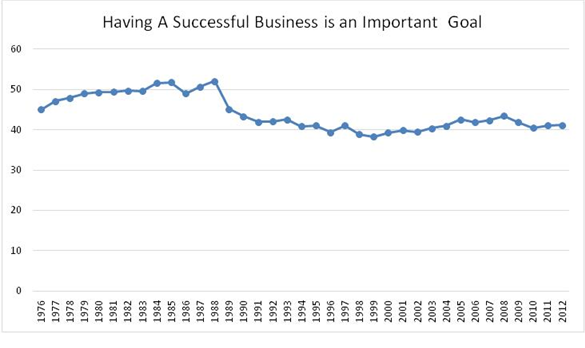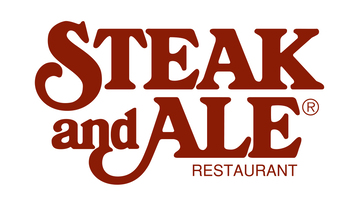College Freshmen, Business Ownership and a Poor Economy
Published on February 18, 2014Share Tweet Share
For those of you searching for some good news about the persistently sluggish economy, here’s something: The weak economy appears to motivate college students to want to be successful business owners.
The most recent annual survey of college freshmen at U.S. academic institutions conducted by the Cooperative Institutional Research Program at the Higher Education Research Institute at UCLA, showed that 41.2 percent of incoming students considered “becoming successful in a business of my own” to be a “very important” or “essential” objective in 2012. That’s more students than consider it “very important” or “essential” to “influence the political structure,” to become “involved in programs to clean up the environment,” or to make “a theoretical contribution to science.”
While the annual snapshot is interesting, the longitudinal data are even more compelling because they show the ebb and flow in the fraction of students who want to be successful business owners over time.
The chart below shows the fraction of incoming college students who consider having a successful business to be an important goal each year from 1976 to 2012. As you can see, the current fraction is down substantially from its peak at 52.1 in 1988.

Source: Created from data from the “American Freshman” survey conducted by the Cooperative Institutional Research Program at the Higher Education Research Institute at UCLA
To see why the numbers might move up and down, I took a look at which economic factors correlated with a larger fraction of students expressing the goal of achieving entrepreneurial success. Specifically I looked at inflation-adjusted median per capita income, real gross domestic product, and the misery index – the unemployment rate plus the inflation rate. The correlations with all three variables tell a similar story: When the economy is doing well, fewer incoming college students are interested in becoming successful business owners than when the economy is doing poorly. Specifically, between 1976 and 2012,
- The Misery Index correlates 0.64 (a correlation of 1.0 means that two numbers move in perfect alignment) with the percentage of students who have the goal of being a successful company owner.
- Real gross domestic product correlates -0.73 with the share of students who want to of be successful in businesses of their own.
- Real per capita income correlates -0.81 with the fraction of college freshmen who have the goal of being success in their own companies.
These are only correlations – either measure could be the cause of the other, or both measures could be the result of a third factor. Moreover, the respondents to the survey may be focusing on the idea of economic success rather than the concept of business ownership when answering the question. Nevertheless, it’s interesting to note that there is a negative relationship between the status of the economy and the fraction of students whose objective is to be a successful business owner.
Perhaps when the economy is doing better than it is right now, a higher fraction of college students have goals other than small business success.
Not sure how much can you afford?
Fill out our Franchise Affordability Calculator


Voyage Franchising
Related Articles
Franchising and Murphy’s Law
When it comes to franchising, Murphy’s Law comes into play more often than desired. In many cases, a new franchise takes off slower than anticipated.
Growing Your Franchise System Takes More Than Leads
The emphasis on franchise system growth is as old as franchising, having been accepted as the indicator of a quality franchise.
Franchisors Need to Avoid Wasting Their Franchisee Leads
When franchisors strategize their system growth, the major focus is placed on the amount and quality of their franchisee leads.
The Two Traits You Need in A New Hire
After owning 4 successful businesses, in different business sectors, there are two common attributes my good hires have shared; Curiosity and Tenacity.
Monitoring your Consumer Sentiment Is Key to Selling your Franchise
In the franchise industry, franchisors can view comparisons and relationships between consumer satisfaction for the products or services a franchise offers.
The TOP 4 Traits Of A Successful Franchise System
These traits lead to low franchisee turnover, an attractive investment opportunity, outlet growth and brand recognition and consumer satisfaction.
The #1 Reason You Are Scared to Open Your Own Business
Owning a business is hard. Each venture has its differences – different customers, different go-to-market strategies, different business partners.








